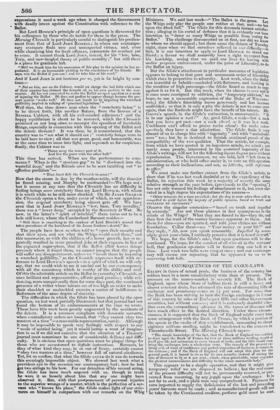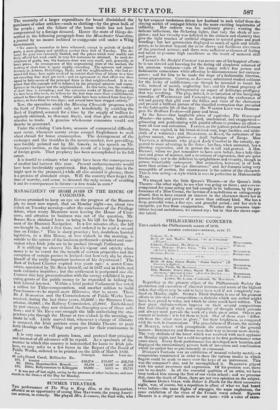SOME CONSEQUENCES OF THE CORN-LAWS.
EXCEPT in times of actual panic, the business of the country has seldom been in a more unsatisfactory state than at present. The pressure on the money-market is severely felt. The Bank of England, upon whose store of bullion there is still a heavy and almost constant drain, has advanced the rate of discounting bills of exchange and promissory-notes to 51 per cent. For some time the Bank has been striving to turn the foreign exchanges in favour of this country by sales of Exchequer Bills and other Government securities, but without success ; and it is extremely doubtfhl whe- ther even the extraordinary advance in the terms of discount wdl have much effect in the desired direction. Under these circum- stances, it is suggested that the Bank of England might enter into some arrangement with the Bank of France, by which a portion of the specie in the vaults of that establishment, amounting to about eighteen millions sterling, might be transferred to the concern in Threadneedle Street. The Morning Chronicle says- " The simple knowledge of the fact, that the Bank of Englaud was entitled to draw upon the Bank of France for two or three millions sterling, would of
itself give life and animation to every 'branch of trade, and the bills would soon
bring the exchanges into a wholesome state. The remedy of the present ex- isting evil, of want of confidence and pern!ct stagnation of business, is simple in the extreme ; and if the Bank of England will not adopt this plan for the general good, it is bound to do so for its own security, instead of raising the rate of discount to 51- or 6 per cent., which, when practicable, must engender the greatest inconvenience and difficulty to the whole mercantile body."
This appears to be a simple operation, and that it might give temporary relief we are disposed to believe ; but the real cause of the present difficulty will not be permanently removed, or pre- vented from recurring, by any joggle upon the exchanges. It is not far to seek, and a plain man may comprehend it. Payment for corn imported to supply the deficiencies of the last and preceding years' harvests must be made ; and as manufactured goods . not be taken by the Continental creditor, perforce gold must be sent. The necessity of a larger expenditure for bread diminished the purchases of other articles—such as clothing—by the great bulk of the people ; and the failure of the home trade has not been compensated by a foreign demand. hence the state of things de- scribed in the following paragraph from the Manchester Guardian, a journal by no means inclined to exaggerate evil under a Whig Government.
s We scarcely remember to have witnessed, except in -periods of decided
panic., a more gloomy and spirit1el49 market than that of uesday. The de-
naiad for yarn was i extremely limited, and the prices which were readily and freely offered last week could. iii very few instances be obtained. In most de- scrititions of goods, too, the business done was very small, and, generally, at lower prices. In consequence of this unpromising state of the market, the working of short time is again rapidly extending. The spinners and mann- faef areis in Ashton, Stalybridge, Hyde, and the neighbourhood, who had re- sumed full time, have again resolved to restrict their time of labour to a time not exceeding four days per week : and an agreement to that effect was then signed by forty-seven of the principal firms in that neighbourhood. It is ex- pected that this example will be followed by the principal splinters and manu- liteturers in Stockport and the neighbourhood. In this town, too, the working of short time is extending ; and the extensive works of Messrs. Birleys and CO. have been this week, we believe for the first time since their establishment, reduced to three days per week. Other mills have been reduced from four days to three, or front three to two days; and several have been stopped entirely."
Now, the operation which the Morning Chronicle proposes with the Bank of France, could only act beneficially by enabling the Batik of England, secured for a time by the supply of bullion ir- regularly obtained, to discount freely, and thus give an artificial stimulus to trade. A genuine wholesome commerce would not thereby be generated.
Under the existing Corn-laws, seasons of commercial difficulty must occur, whenever scanty crops compel Englishmen to seek wheat abroad for home consumption. The derangement of the exchanges and the troubles in the money-market, now prevailing, were forcibly pointed out by Mr. Giorrn, in his speech on Mr. VILLIEUS'S motion, as the inevitable result of a large importation of foreign grain. That prophecy has been accomplished to its full extent.
It is fearful to estimate what might have been the consequences of another bad harvest this year. Present embarrassments would have been incalculably aggravated. But, happily, (and this is the bright spot in the prospect,) while all else around is gloomy, there is a promise of' abundant crops. Will the country then forget the time of scarcity, and cease to demand the only means of avoiding it and its consequences in future—a free trade in corn ?



























 Previous page
Previous page